Blogging Dell Comics’ Hercules and Hercules Unchained
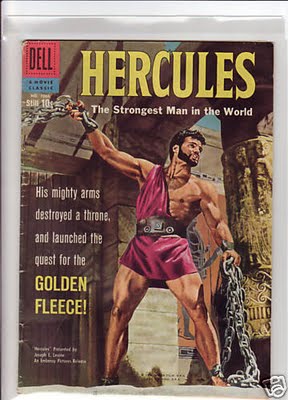
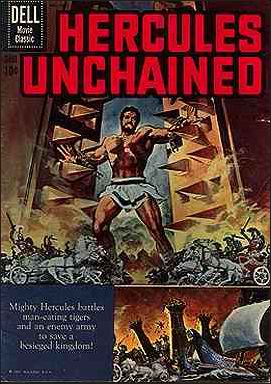 When bodybuilder turned actor Arnold Schwarzenegger brought Robert E. Howard’s Conan the Barbarian to the big screen in a pair of stylish costume dramas in the early 1980s, it ushered in a Sword and Sorcery craze with scores of imitators on the big and small screen eager to recapture the first film’s runaway success. For many, it was as if history was repeating itself for in the 1950s, bodybuilder turned actor Steve Reeves had starred in a pair of Sand and Sandal epics, Hercules and Hercules Unchained that created a similar sensation. The Italian sword and sandal craze (or peplum, to use their proper title) dominated the European box office in the late 1950s until the advent of the so-called Spaghetti western in 1964. The film that started it all was Pietro Francisi’s The Labors of Hercules (1957) which was dubbed in English by Joseph Levine’s fledgling Embassy Pictures and released as Hercules by Warner Bros. in the US in 1958. Its success led to a Dell Comics adaptation by the legendary John Buscema in 1959.
When bodybuilder turned actor Arnold Schwarzenegger brought Robert E. Howard’s Conan the Barbarian to the big screen in a pair of stylish costume dramas in the early 1980s, it ushered in a Sword and Sorcery craze with scores of imitators on the big and small screen eager to recapture the first film’s runaway success. For many, it was as if history was repeating itself for in the 1950s, bodybuilder turned actor Steve Reeves had starred in a pair of Sand and Sandal epics, Hercules and Hercules Unchained that created a similar sensation. The Italian sword and sandal craze (or peplum, to use their proper title) dominated the European box office in the late 1950s until the advent of the so-called Spaghetti western in 1964. The film that started it all was Pietro Francisi’s The Labors of Hercules (1957) which was dubbed in English by Joseph Levine’s fledgling Embassy Pictures and released as Hercules by Warner Bros. in the US in 1958. Its success led to a Dell Comics adaptation by the legendary John Buscema in 1959.
The plot of this first film was a reworking of the Greek myth of Jason and the Golden Fleece with Heracles (going by his Roman name, Hercules) promoted from a supporting player to the lead role. Of course within a few years, Charles Schneer and Ray Harryhausen would cover much of the same territory with Jason and the Argonauts (1963) creating a lasting classic which would quickly supplant the movie that started it all. The latter film’s longevity is largely due to Harryhausen’s superb stop motion effects work which continues to influence film-makers after half a century.
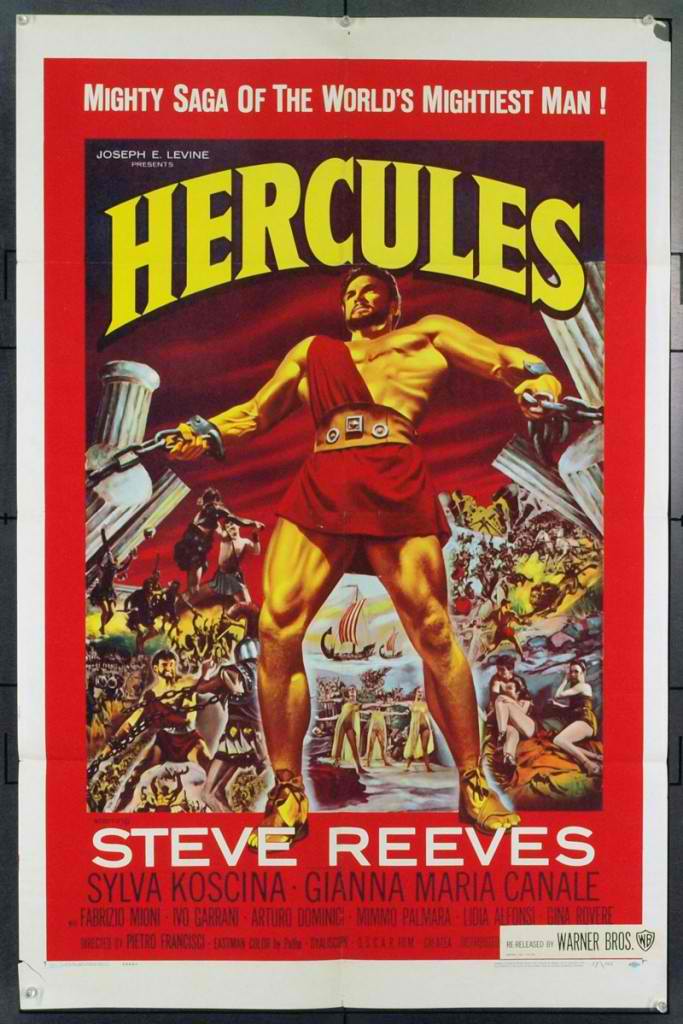
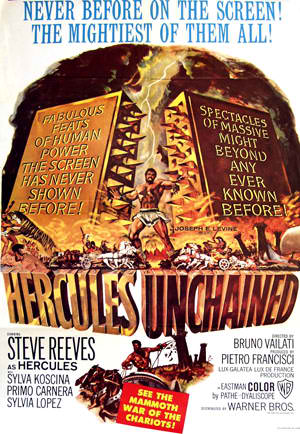 Hercules and its sequel suffer from a low budget and poor dubbing, not necessarily a stumbling block for matinee audiences as Toho’s Godzilla franchise quickly proved, but enough to make the Sand and Sandal pictures fade to near obscurity thanks to the rapidly changing expectations of a more sophisticated audience. Happily, Dell’s comic adaptations are unhindered by such shortcomings and give the reader a sense of how these films must have been perceived by a young and impressionable audience upon their initial theatrical release.
Hercules and its sequel suffer from a low budget and poor dubbing, not necessarily a stumbling block for matinee audiences as Toho’s Godzilla franchise quickly proved, but enough to make the Sand and Sandal pictures fade to near obscurity thanks to the rapidly changing expectations of a more sophisticated audience. Happily, Dell’s comic adaptations are unhindered by such shortcomings and give the reader a sense of how these films must have been perceived by a young and impressionable audience upon their initial theatrical release.
Hercules quickly establishes the mythological demi-god as he rescues a damsel in distress. One must overlook the necessity of the damsel being the Princess Jole whose father, the King of Jolco has called upon Hercules from the neighboring kingdom of Thebes to come to their aid. Jolco has been accursed for over a decade since the night King Aeson was murdered leaving his brother Pelias to ascend to the throne. Aeson’s heir, Jason disappeared that same night along with Jolco’s royal symbol, the Golden Fleece and Chiron, the captain of the guard. In his absence, Chiron was accused of the crimes. Hercules believes Chiron was falsely accused because he had been Hercules’ mentor. King Pelias has sent for Hercules to make his insolent son Iphitus fit to rule.
No sooner have we digested all of this then the setting shifts to Sybil the Oracle of Jolco who informs King Pelias to beware the man with one sandal. Iphitus laughs off the prophecy as superstition. Upon Jole and Hercules’ arrival in Jolco, Iphitus quickly shows his resentment of the demi-god. Soon thereafter, Hercules accepts adoring young Ulysses as his squire while the poet Orpheus finds inspiration in the appearance of the famed demi-god among the people of Jolco. Hercules publicly humiliates Iphitus by showing how the boy Ulysses can best him at archery thanks to the demi-god’s coaching. Iphitus storms off enraged. No sooner has this happened then word reaches Hercules that the Nemean Lion is terrorizing Jolco and has slain a woman and her children. Hercules tracks down and slays the beast but not before it manages to kill Iphitus. King Pelias blames Hercules for his son’s fatal recklessness and accepts the counsel of Eurysteus and sets the demi-god the task of vanquishing the Cretan Bull to make amends.
Jole likewise blames Hercules for her brother’s death. Upset, the demi-god seeks the wisdom of Sybil who tells him it is the will of the gods. Angered by the oracle, Hercules renounces his godhood. Instantly a terrible storm rips the sky. Stripped of his divine nature, the now mortal Hercules fights and defeats the Cretan Bull (in what is Buscema’s finest piece of art in the story) before chancing upon a cave where his mentor Chiron lies on his deathbed with Jason at his side. Chiron tells Hercules the Golden Fleece is on the coast of Colchis and that he must retrieve it to restore Jason to the throne of Jolco as the rightful heir. Returning to Jolco, Jason loses his sandal en route. King Pelias is reluctant to believe the stranger is the now grown Jason and sets him with the task of retrieving the Golden Fleece to prove himself. Orpheus suggests that Argos’ new ship would be perfect for the voyage and the sailor readily agrees. Pelias is troubled to note that Jason has only one sandal remembering Sybil’s prophecy. Eurysteus agrees to accompany them on their voyage promising the King that Jason will not return alive. Pelias, in turn, agrees to give Eurysteus his daughter’s hand in marriage.
The character of Argos is never really fleshed out, but an important shift occurs in the story at this point as Jason begins to overshadow Hercules. Orpheus accompanies the crew as a minstrel while Ulysses is soon given an opportunity to prove his worth as more than just audience identification for the target market of young males. Eurysteus attempts to stir a mutiny, but it is quickly put down by Hercules who intimidates the crew into submission. The ship stops at a tropical island to gather food. The crew is captured by a tribe of Amazons who bring them before Queen Antea. Ulysses overhears the Queen speaking with an old crone in a nearby cave and learns that after a night of lovemaking, the men will die per the Amazon custom. Queen Antea is saddened by this as she and Jason have quickly fallen in love. Ulysses drugs Amazons and Argonauts alike and he and Hercules carry the sleeping crew off, saving them from their fate.
A short time later, they arrive at Colchis where they are set upon by a tribe of Neanderthals as soon as they reach the shore. Jason quickly locates the Golden Fleece, but is attacked by a dinosaur which he rather easily dispatches with a spear. Retrieving the Golden Fleece, he finds a message scrawled on the back by his father naming Jason’s Uncle Pelias as his murderer. Hercules swears to avenge Jason’s father, but Jason proves his nobility and demands no blood be shed unless unavoidable. The ship returns to Jolco. As they prepare to disembark, Jason discovers that Eurysteus is gone and the Golden Fleece with him. The traitor presents the royal symbol of Jolco to King Pelias demanding his reward. The King sees the damning message from his late brother scrawled on the back and starts to burn it to prevent his role as an assassin from being revealed. Hercules arrives at the palace and saves the Golden Fleece, but falls through a trap door. King Pelias turns his men on the Argonauts declaring Jason an imposter. Princess Jole rushes to Hercules’ cell and declares her love for him, giving him the motivation to break free of his bonds and out of his prison.
The mighty hero singlehandedly turns the tide of battle against Pelias’ men, knocking down the palace by overturning its pillars (like Samson) to bury the soldiers alive. Eurysteus is dispatched by Hercules when he inadvertently is choked to death by the chains that had bound the hero which Hercules now wields as a weapon to flay his enemies. King Pelias takes his own life by drinking poison, begging his now shamed daughter’s forgiveness as he expires. The Golden Fleece is restored to the people of Jolco. Hercules and Jole (stripped of her royal heritage just as Hercules is stripped of his godhood) wed. The story ends with the two lovers setting sail to return to Thebes while Orpheus sings of Hercules’ fabled exploits. The adaptation is rounded out with two short supporting features covering the mythological Labors of Hercules and a potted history of Greek warfare, respectively.
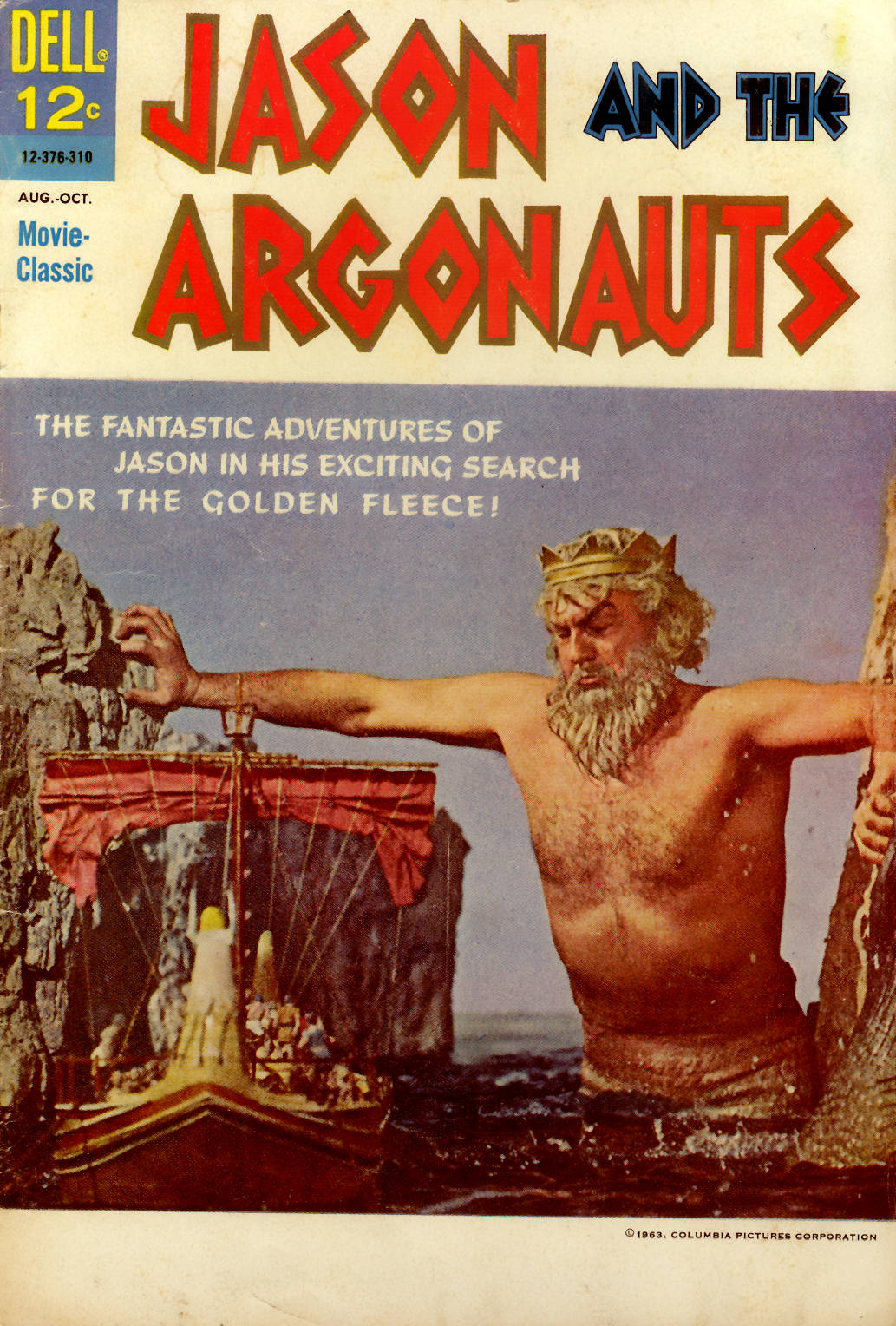
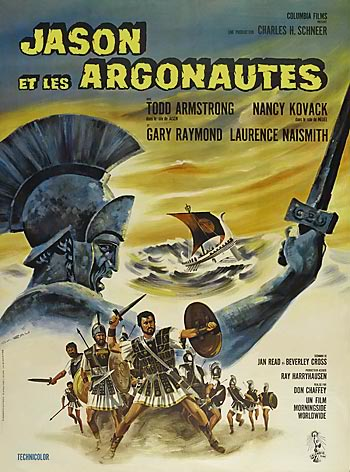 Pietro Francisi’s 1959 sequel, Hercules and the Queen of Lydia was again dubbed into English and re-titled Hercules Unchained by Embassy Pictures for Warner Bros. to release in 1960. Dell Comics’ one-shot adaptation of the film was adapted by Reed Crandall in place of John Buscema. Overall, Crandall’s work is smoother despite the fact that the material is notably weaker the second time around. The sequel gets underway where the first film left off with the newlyweds Hercules and Jole stopping off in Ithaca, Ulysses’ home, en route to Thebes. It is revealed that Ulysses is the son of King Laertes of Ithaca. In an echo of the earlier film, the King asks Hercules to train his young son to be worthy of the crown. King Laertes sends a homing pigeon with his son in what has to be one of the more obvious plot devices.
Pietro Francisi’s 1959 sequel, Hercules and the Queen of Lydia was again dubbed into English and re-titled Hercules Unchained by Embassy Pictures for Warner Bros. to release in 1960. Dell Comics’ one-shot adaptation of the film was adapted by Reed Crandall in place of John Buscema. Overall, Crandall’s work is smoother despite the fact that the material is notably weaker the second time around. The sequel gets underway where the first film left off with the newlyweds Hercules and Jole stopping off in Ithaca, Ulysses’ home, en route to Thebes. It is revealed that Ulysses is the son of King Laertes of Ithaca. In an echo of the earlier film, the King asks Hercules to train his young son to be worthy of the crown. King Laertes sends a homing pigeon with his son in what has to be one of the more obvious plot devices.
Hercules finds you can’t go home again as Thebes is on the verge of war with the neighboring kingdom of Argives. On the road to Thebes, the trio is harassed by the demi-god Antaeus, but Hercules defeats him with a combination of brawn and brain. Fleeing an Argive patrol, they seek refuge in a cave where Hercules finds Oedipus, deposed King of Thebes who informs him it was his sons, Eteocles and Polynices who drove their father into exile and then turned on one another to claim the throne. Eteocles now rules Thebes as a despot while Polynices has allied himself with the Argives in an attempt to overthrow his brother. Hercules vows to restore peace to his homeland.
Reaching the palace, Hercules appeals for peace to end the hostilities. Eteocles agrees to abdicate and go into exile in Egypt. He sends Hercules and Ulysses to deliver a treaty to Polynices. Jole remains behind at the palace for safety. The story then drifts into a contrived recycling of the Amazon episode from the first film as Hercules drinks from the Waters of Forgetfulness and slips into unconsciousness. The sleeping hero and helpless Ulysses are taken captive by soldiers from the kingdom of Lydia. They present the amnesiac Hercules as a gift to Queen Omphale who claims him for her consort. Ulysses, pressed into service as a slave, releases his homing pigeon to return to Ithaca and have his father, King Laertes send reinforcements to rescue them.
While Laertes assembles the Argonauts to rescue his son, King Eteocles grows suspicious of Hercules and Ulysses’ absence and fears they have betrayed him. Taking Jole hostage, he renounces his intent to abdicate and declares war on Argives. As in the Amazon episode, Ulysses learns the Queen’s plans after overhearing a conversation in a nearby cave. Queen Omphale is revealed to be allied to a mysterious Egyptian who turns her lovers into living statues once she tires of them. Ulysses glimpses the hall of the Queen’s discarded lovers before leaving the cave. King Laertes and the Argonauts arrive, but are captured by Queen Omphale’s men. Hercules’ memory returns and he yet again topples the palace down upon the soldiers allowing the Argonauts to escape.
As the Argive army gathers outside the gates of the palace, Polynices sends an emissary to his brother suggesting they settle their dispute with a duel to avoid destroying their kingdom. Eteocles agrees. The Argonauts reach Thebes, but Hercules blunders his way into the gladiatorial pit and is rescued from a pair of tigers only by Ulysses’ prowess as an archer. Oedipus’ traitorous sons slay themselves in their pointless duel. The Argives attack Thebes, but Hercules uses his mighty strength to pull down the twin guard towers upon their enemies. The invasion ended, peace is restored to Thebes and Hercules and Jole are reunited. Reed Crandall gets his own take on the mythological Labors of Hercules in a short supporting feature at the end of the book.
Both Hercules and Hercules Unchained offer nostalgic fun as vintage comics that work better than the films they adapted. The former certainly pales next to Jason and the Argonauts (itself adapted as a Dell one-shot in 1963) while the mighty demi-god would finally be given a worthy comic adaptation from Charlton Comics later in the decade as we shall see in next week’s article.
William Patrick Maynard was authorized to continue Sax Rohmer’s Fu Manchu thrillers beginning with The Terror of Fu Manchu (2009; Black Coat Press). A sequel, The Destiny of Fu Manchu was published earlier this year by Black Coat Press. Next up is a collection of short stories featuring an Edwardian detective, The Occult Case Book of Shankar Hardwicke and a hardboiled detective novel, Lawhead. To see additional articles by William, visit his blog at SetiSays.blogspot.com